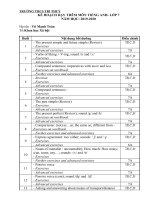2019-2020-02-NT6410_Book-of-Revelation
Bạn đang xem bản rút gọn của tài liệu. Xem và tải ngay bản đầy đủ của tài liệu tại đây (99.58 KB, 5 trang )
THE BOOK OF REVELATION
02NT6410/01
Reformed Theological Seminary Spring 2020
Instructor C. E. Hill
Office hrs. Mondays 3:00-5:00; Tuesdays 10:00-12:00
Tuesdays 2-4 pm
Welcome to this course on this most fascinating book! Matters to be stressed in the course
include:
Backgrounds in Jewish Apocalyptic – including readings of primary sources
Historical Methods of Approaching Revelation
The Structure of the Book and Its Visions
Christ’s Present Kingdom according to Revelation
The OT Backgrounds to the Symbolism of Revelation
Identifying the Opponents in Revelation (the dragon, the beast, the false prophet)
The Eschatology of Revelation and the Meaning of the Millennium
The Early Reception and Interpretation of Revelation in the Church
Preaching and Teaching Revelation in the Church Today
MDiv* Student Learning Outcomes
In order to measure the success of the MDiv curriculum,
RTS has defined the following as the intended outcomes
of the student learning process. Each course contributes
to these overall outcomes. This rubric shows the
contribution of this course to the MDiv outcomes.
*As the MDiv is the core degree at RTS, the MDiv rubric
will be used in this syllabus.
Broadly understands and articulates
Articulation
knowledge, both oral and written, of
(oral &
essential biblical, theological,
written)
historical, and cultural/global
information, including details,
concepts, and frameworks.
Scripture
Significant knowledge of the original
meaning of Scripture. Also, the
concepts for and skill to research
further into the original meaning of
Scripture and to apply Scripture to a
variety of modern circumstances.
(Includes appropriate use of original
languages and hermeneutics; and
integrates theological, historical, and
cultural/global perspectives.)
Reformed
Significant knowledge of Reformed
Theology
theology and practice, with emphasis
on the Westminster Standards.
Rubric
Strong
Moderate
Minimal
None
Mini-Justification
Moderate
The Course encourages articulate oral
expression in class presentations and
discussions and incorporates a term
paper for the furtherance of effective
written communication.
Strong
The course deals directly with the book
of Revelation and involves outside
readings as well. Significant reference is
made to the original language, and to a
variety of historical and contemporary
interpretations.
Moderate
Not a theology course per se, but
theological aspects of Revelation are
explored, particularly in the context of
larger Biblical Theological themes.
2
Sanctification
Desire for
Worldview
Winsomely
Reformed
Preach
Worship
Shepherd
Church/
World
Demonstrates a love for the Triune
God that aids the student’s
sanctification.
Burning desire to conform all of life to
the Word of God.
Minimal/Moder
ate
Embraces a winsomely Reformed
ethos. (Includes an appropriate
ecumenical spirit with other Christians,
especially Evangelicals; a concern to
present the Gospel in a God-honoring
manner to non-Christians; and a truthin-love attitude in disagreements.)
Ability to preach and teach the
meaning of Scripture to both heart and
mind with clarity and enthusiasm.
Knowledgeable of historic and modern
Christian-worship forms; and ability to
construct and skill to lead a worship
service.
Ability to shepherd the local
congregation: aiding in spiritual
maturity; promoting use of gifts and
callings; and encouraging a concern for
non-Christians, both in America and
worldwide.
Ability to interact within a
denominational context, within the
broader worldwide church, and with
significant public issues.
Moderate
Moderate
Minimal
Minimal
Minimal
Minimal
Teaching sessions regularly accompanied
by prayer. Scripture is approached as
under Christ’s lordship.
We are dealing with some of the
foundational building blocks of a Biblical
world view. The book of Revelation is a
critical book for understanding the
Christian life in this age.
To the extent that being winsome has
anything to do with being Reformed, we
seek to embody the ideal in this class!
Different points of view are lovingly
criticized; erroneous ones are tenderly
rebuked or trashed with a smile.
No preaching techniques are offered
here, only the essential materials on
which all sound preaching is based!
No emphasis on forms or skill in leading
worship, only a better grasp on the
Biblical teaching by which God is
worshipped in Spirit and in truth.
Applications occasionally made to the
local congregation and to fulfillment of
the Great Commission.
The course helps to provide the crucial
Biblical underpinnings to such
involvement.
I. SCHEDULE
Week Date
1
F 11
2
F 18
3
F 25
4
M3
Topic and Readings
Introduction
Readings
For each week, please read the relevant passage in Revelation, in
Beale, and in Victorinus, and any other passages cited below for that day.
Be ready to report on your commentator’s exegesis.
Rev. 1:1-8; Introductory Issues; Structure; Hermeneutics
1 Enoch 1-36 (Book of the Watchers). Note the description of
earthly blessedness
in 10.17-19; the individual eschatology in ch. 22.
Rev. 1:9-3:22: 1st Vision and the 7 Letters
Daniel 7, 9
Rev. 4-5: 2nd Vision
Ezek. 1, 10
3
5
6
M 10
M 17
M 24
Rev. 6-7; The 6 Seals
Rev. 8-9; The 7th Seal; The 7 Trumpets
Spring Reading Week
4 Ezra 1-14. Note all aspects of eschatology.
2 Baruch. Note all aspects of eschatology
1 Enoch 37-71 (Book of the Similitudes). Note all aspects of
eschatology
7
M 31
Rev. 10-11; The Little Scroll; The Two Witnesses
Zechariah 4
8
A7
Rev. 12-13: The Woman, the Child, and the Dragon; The Dragon
and the Beasts
Daniel 9
9
A 14
Rev. 14-15; Mt Zion; 7 Messages; 7 Angels
10
A 21
Rev. 16-17; The 7 Bowls; The 3rd Vision: Babylon
11
A 28
Rev. 18-19; Aftermath: The Fall of Babylon; The Return of Christ
Jeremiah 50-51
12
M5
Rev. 20; The Millennium and Last Judgment
Genesis 3
Irenaeus, Against Heresies, book 5
13
M 12
Rev. 20-21; The 4th Vision: New Jerusalem; Epilogue
II. READINGS
Primary Sources
Daniel
Ezekiel 1, 10
1 Enoch 1-36; 37-71 (the Similitudes of Enoch)
4 Ezra
2 Baruch
The Apocalypse of John
Irenaeus, Against Heresies, Book 5
Victorinus of Petovium Commentary on the Apocalypse (see Weinrich, below).
Secondary Sources
Beale, G. K., Revelation. A Shorter Commentary (Grand Rapids/Cambridge: Eerdmans).
562 pp.
Hill, C. E., Regnum Caelorum. Patterns of Millennial Thought in Early Christianity
(Grand Rapids: Eerdmans, 2001). 272 pp.
Another approved commentary on Revelation. Commentaries shall be chosen from the
following list, or else by application approved by the instructor. If you have completed
Greek II, you are encouraged to choose a commentary on the Greek text.
Andrew of Caesarea. Commentary on the Apocalypse, tr. by Eugenia Scarvelis Constantinou Robinson
(Washington, D.C.: The Catholic University of America Press, 2011).
4
Apringus of Beja, Explanation of the Revelation by the Most Learned Man, Apringus, Bishop of Pax (Julia)
(see Weinrich)
Aune, D. Revelation. 3 vols. WBC 52 (Dallas: Word, 1997-98).
Beale, G. K., The Book of Revelation. A Commentary on the Greek Text, NIGTC (Grand Rapids:
Eerdmans, 1999).
Bede, The Exposition of the Apocalypse by Bede the Venerable (see Weinrich)
Caesarius of Arles, Exposition on the Apocalypse (see Weinrich)
Caird. G. B. A Commentary on the Revelation of St John the Divine, HNTC (New York: Harper and Row,
1966).
Collins, A. Yarbro., The Apocalypse NTM (Wilmington: M. Glazier, 1979).
Beasley-Murray, G. R., Revelation, NCB (Grand Rapids: Eerdmans, 1974; 1983).
Hendriksen, W., More than Conquerors (Grand Rapids: Baker, 1940; 1982).
Kistemaker, S., Revelation (Grand Rapids: Baker, 2002),
Koester, C. Revelation. A New Translation with Introduction and Commentary. AB 38A. (New Haven &
London: Yale University Press, 2014).
Ladd, G. E., Revelation (Grand Rapids; Eerdmans, 1972).
Osborne, G. R. Revelation. BECNT (Grand Rapids, MI: Baker Academic, 2002).
Roloff, Jürgen, Revelation. Continental Commentary Series (Minneapolis: Fortress, 1993). 275pp.
Stuart, Moses, A Commentary on the Apocalypse 2 vols. (London: Wiley and Putnam, 1845)
Swete, H. B. The Apocalypse of St John. The Greek Text with Introduction Notes and Indices (London:
Macmillan and Co., 1911).
Tyconius, Exposition of the Apocalypse, tr. by Francis X. Gumerlock, intro. and notes by David C.
Robinson (Washington, D.C.: The Catholic University of America Press, 2017).
Weinrich, William C., Latin Commentaries on Revelation, Ancient Christian Texts (Downers Grove,
InterVArsity Press, 2011).
Witherington, Ben III. Revelation (Cambridge: Cambridge University Press, 2003).
III. ASSIGNMENTS
After the first week, most of our class time will be characterized by lecture and
discussion. Students are expected to have read and taken notes from your chosen
commentary for the portion of Revelation covered in that week. After (or in conjunction
with) each lecture/discussion each week, class members will report on the contributions
of their commentators.
1. Weekly oral discussions/quizzes over the reading assignments. 20%
2. Oral presentation of paper. 20%
3. Final written paper. 60%
PAPER.
• This is to be a 7,000 (no shorter) to 9,000 (no longer) paper focusing on some
aspect of the interpretation of the book of Revelation.
• A final word count must be printed on the cover sheet of your paper.
• You must take the initiative to consult with the professor at least five weeks prior to
the paper due date as to your topic.
• If you have had Greek, you MUST interact with the Greek text in your paper AND
append to your paper your translation of a selected portion of the Greek text of
5
Revelation. The selection will be determined in consultation with the professor
based on the passage you choose to work on, but it should typically extend to at
least 6-10 verses. Your translation should be accompanied by the Greek text and
any footnotes explaining significant translational or text-critical decisions you
make.
• If you have not had Greek, your paper must still be based on sound exegetical
principles and a firm grasp of the text.
• The paper should have a clear introduction, body, and conclusion. It may take a
number of different approaches or formats (see below) but it is always good to
begin with a thesis statement in your introduction.
• The paper may be a close exegetical study (e.g., on the Lamb and the scroll in 5:14), a theological study based closely on the text of Revelation (e.g., the meaning
of Christ as Lamb of God; God as the Almighty; the Holy Spirit in Revelation), a
study in the history of interpretation (Who is Babylon in patristic or medieval or
Reformation exegesis; the hermeneutical method of Tyconius’s Exposition of the
Apocalypse), a study of the OT or other Biblical background for a passage or an
image in Revelation (The Ezekielian Background of Rev. 9; The Jeremian
background of Babylon).









